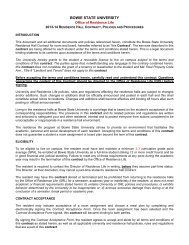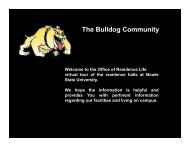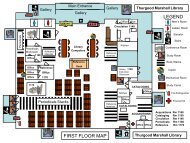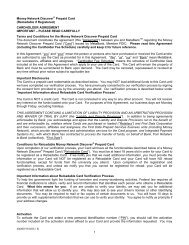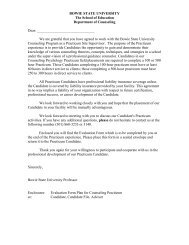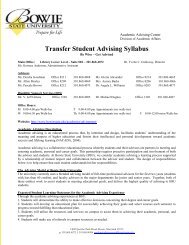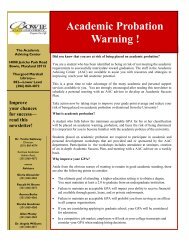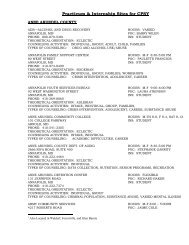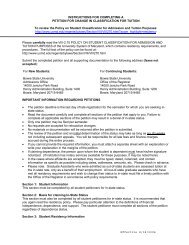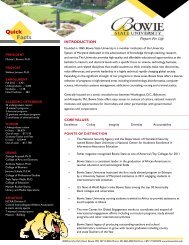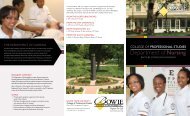2009-2010 - Bowie State University
2009-2010 - Bowie State University
2009-2010 - Bowie State University
You also want an ePaper? Increase the reach of your titles
YUMPU automatically turns print PDFs into web optimized ePapers that Google loves.
throughout preconception and the childbearing process, as well as the neonatal period up to the first six weeks of infancy. The course also<br />
includes content regarding the specific health needs of women throughout the lifespan.<br />
Prerequisites: Completion of NURS308, NURS315, NURS348/459, NURS368 with a grade of “C” or better.<br />
Lecture<br />
NURS 381 Maternal, Newborn, and Women’s Health<br />
2 Credits<br />
This clinical course must be taken concurrently with NURS 380. This clinical component focuses on nursing care of clients during the<br />
childbearing phase of the life cycle. The student completes holistic assessments and implements therapeutic nursing interventions for women,<br />
infants and families in acute care and community based settings. This course must be taken concurrently with NURS 380<br />
Clinical<br />
NURS 385 Psychiatric Mental Health Nursing<br />
3 Credits<br />
This course examines the needs of clients experiencing behavioral health and/or psychiatric‐mental health problems and the application<br />
process to restore, maintain and/or enhance mastery in life and role functioning. This course applies the Concepts‐Based Curriculum Model as<br />
designed by the <strong>Bowie</strong>’s <strong>State</strong>’s Department of Nursing. Theories, principles, concepts and skills for promoting client mental health and wellbeing<br />
are stressed.<br />
Prerequisites: NURS 308, NURS 315, NURS 348/349, NURS 368<br />
Lecture<br />
NURS 386 Psychiatric Mental Health Clinical<br />
2 Credits<br />
This clinical course must be taken with NURS 385. This course focuses on the nursing care of clients with psychiatric‐ mental health and<br />
behavioral health needs and the nursing interventions required to restore, maintain, and/or enhance mastery in life and role functioning.<br />
Applying varying psychiatric mental health models, the student completes holistic assessments and implements therapeutic nursing<br />
interventions for the client in a variety of behavioral health settings.<br />
This course must be taken concurrently with NURS 385<br />
Clinical<br />
NURS 390 Women’s Health Issues<br />
3 Credits<br />
This course examines health issues of women in relation to the various roles women play in society. Special emphasis is placed on physical and<br />
psychological changes that occur throughout a woman’s life cycle. Students are assisted in gaining a better understanding of preventive health<br />
practices, common health concerns, and resources to address these concerns.<br />
Lecture<br />
NURS 400 Introduction to Nursing Research<br />
3 Credits<br />
This course introduces students to general principles and concepts related to the research process in nursing practice and theory. Emphasis is<br />
given to: the role of the professional nurse as a consumer of research; expanding decision‐making through the use of research findings;<br />
evaluating the usefulness of research findings for current practice.<br />
Prerequisites: Elementary Statistics<br />
Lecture<br />
NURS 401 Concepts in Family Health<br />
3 Credits<br />
This course is designed to provide students with theoretical content and developmental theory related to family functioning and development.<br />
The emphasis is on concepts and theories pertaining to family structure, processes, and function. Stressors influencing family functioning are<br />
discussed. Interactive assignments working with families will provide opportunities for students to assess family structure, processes, and<br />
functions.<br />
Pre‐requisites: (RN students only) Completion of NURS 350, 302, and 368<br />
Lecture<br />
NURS 406 Nursing Practice: Community<br />
3 Credits<br />
This course is designed to provide students with skills necessary to assess and critically analyze at‐risk aggregates and global communities. The<br />
student will develop skills to identify, prioritize, and plan culturally congruent care, which emphasizes health promotion and illness prevention.<br />
This course prepares the student to apply the core concepts of the Department of Nursing while providing care for families, aggregates, and<br />
global communities. Selected theories applicable to community and public health nursing practice are emphasized. Community assessment,<br />
epidemiology, health belief and health promotion models, health education, stress and crisis, cultural diversity, and major health problems of<br />
vulnerable communities are stressed.<br />
Prerequisites: Completion of Junior year nursing courses and NURS 400 with a grade of “C” or better.<br />
Lecture<br />
NURS 409 Clinical Concepts in Community Health<br />
2 Credits<br />
This clinical course must be taken concurrent with NURS 406. It will provide students with opportunities to participate in caring for clients in<br />
various health settings as a component of their community health experience. Students will apply knowledge and skills from nursing and public<br />
<strong>Bowie</strong> <strong>State</strong> <strong>University</strong> 381




